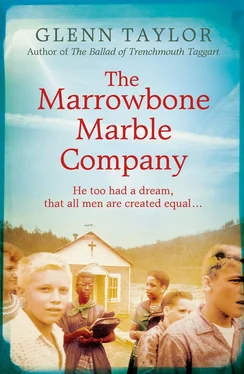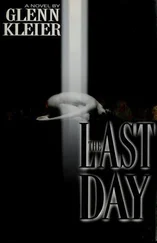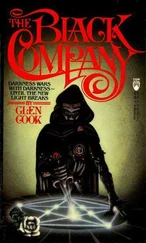T HE CHILD WALKED UNSTEADYfrom one end of the little porch to the other. Her gait possessed a wild, untested confidence. Rachel stood guard, her foot on the first of three porch stairs. Boards were warped and nailheads surfaced. Rachel worried on splinters—Mary’s feet were soft, though she’d been walking for over a month. She lifted her knees to right angles and pounded against the half-rotten boards. Ledford pushed open the screen door with the box he carried. He let Mary pass before him, winked at her, and stepped down from the porch. The Packard’s trunk was up, Bill Ledford’s blowpipe and punty rod jutting out the back. The suicide doors were swung wide open. A single spot remained among all the boxes crammed inside, and Ledford slid the last one there. He’d marked it Attic Junk , and its contents, mostly old books, had nearly caused him to sit down in the dark reaches of his boyhood home and reminisce one last time. But Mack Wells and his family were on their way over. The home had to be emptied.
Ledford slammed the Packard’s heavy doors tight against its contents. Inside those boxes were the remnants of a childhood in two parts—the first recalled in photographs, the second in pay stubs and grade cards that no one ever saw.
There was a sound from the porch.
“Oh dear,” Rachel said.
Ledford turned to see her bent and picking up Mary, who was on all fours, crying.
He pulled out his handkerchief on the way.
Little droplets of blood emerged round from the checkerboard scrape on her knee. “Watch,” Ledford told her. He pressed the white hanky against the skin and pulled it back, showed it to her. “What’s that?” he asked.
Mary quit crying and stared at the crimson mark on the white square.
“That’s a big girl,” Rachel said. She tickled Mary where she held her by the armpits, and the laughing came, harder than the crying. Ledford dabbed once more and the bleeding quit. He bent and brushed his fingers against the porch boards where she’d fallen. A truck backfired, then rumbled past on the street. Its muffler dragged. Ledford watched it stop at Sixth Avenue, and then, still kneeling, he looked back to the porch boards. To the corner, where they met up in a chipped V. He pictured his father’s white buckskin mitt there, just as it had been all those years before, torn to hell by the dog. Then came McDonough’s face. Ledford shook his head and stood up. Mary walked a circle in the frontyard square of crabgrass. Rachel stood by the curb with her hands on her hips. She was turned so that he could see her belly in profile, stretched to full with another child. Best they could figure, she’d gotten pregnant around New Year’s, and here they were, on the precipice of another one.
A car turned off the boulevard and rumbled toward them. “That’s Mack,” Ledford said. He stepped off the porch, picked Mary up, and stood next to Rachel. He waved as the car pulled up the curb, and then he rubbed at the small of Rachel’s back. She’d strained it pushing the stroller over railroad tracks.
Mack Wells stepped from the old Plymouth and nearly slammed the door on his boy, who had hopped the front seat to follow his father. The boy ran around the back of the car and opened the passenger door for his mother. She stepped out and thanked him kindly. For a month, he’d opened all doors for his mother. “That’s what a gentleman does,” his grandfather had told him.
Mack put his hand to his flat cap and nodded. “Ms. Ledford,” he said.
“Hello Mack.” Rachel stepped toward them. “You must be Elizabeth.” She held out her free hand to Mack’s wife in greeting.
“Yes. Everybody calls me Lizzie.” Lizzie wore a rust-colored blouse and matching hat, tilted on her head.
The women shook hands.
“This Harold?” Ledford asked.
“This is him,” Mack said. He rubbed the boy’s head from behind.
“Good to meet you Harold,” Ledford said.
“Pleased to meet you.” Harold looked up at the white family before him. The baby drooled, and he watched it stretch well past her chin, then give and fall to the sidewalk. It made a quiet splat.
No one spoke for a moment. Then Mack inhaled deep through his nose. “Mmm,” he said. “Smell that.”
“Bread factory,” Ledford said. “You’ll smell it everyday.”
Lizzie Wells sniffed the air and smiled politely. She looked mostly at the ground.
Rachel took Mary from Ledford. “Let me show you the space in back for a garden,” she said. Lizzie nodded and followed, leaving the men and the boy by the car.
“If it isn’t the bread smell stirring your stomach, it’s the scrap metal clanging in your ears,” Ledford said. He turned and walked to the house, motioned for them to follow. His limp had come back with all the box hauling. He ignored the burn radiating up his shinbone.
Mack looked back at Harold. He knew the look on the boy’s face. It was fear. Mack felt it too. There wasn’t a black family for a mile in the West End, and he could scarcely believe he’d agreed to rent the house. But when his home loan had fallen through, and his mother had sold her house to move in with his brother, Mack had acted fast. Ledford had told him over lunch one day, “I got a place in the West End you could rent real cheap.” Mack had quit chewing, looked at him like he was crazy. Ledford went on. There weren’t many neighbors, he’d said. There was the scrapyard and the bakery. There was the filling station on the corner, whose owner, Mr. Ballard, was not a hateful type. He had a Negro in his employ, Ledford had told Mack. It had all seemed natural, what with Ledford’s need to hold on to his old house and Mack’s troubles with the Federal Housing Authority. Inside a week, they’d drawn up a lease and shaken hands on it. There’d been some looks in their direction, but neither man paid much mind. They’d become friends, as much as a black man could be with a white one. Mack was the only welcome visitor inside Ledford’s office, the only glass man interested in hearing what Professor Staples had been teaching his young pupil.
The screen door squealed as Ledford opened it and stepped in. “Gas and water and electric are all on and in your name,” he said. The staircase before them sagged at the middle of each riser. It would be good to have a boy running up and down again. Ledford smiled, “Wasn’t always that way with the water and electric. We used to barrel-catch rain and heat it.”
“I know about that,” Mack said. He surveyed the living room. “You ain’t taking that big chair?”
“It’s yours if you want it.” Ledford regarded the wide upholstery. It had been his father’s drinking chair. On payday, he’d pass out cold and spill all over it. The smell still turned Ledford’s stomach.
Young Harold walked over past the chair. He looked at the builtin bookcase, the few books left there. He whispered, sounding out the spines.
“Book on baseball there. Go on and grab it,” Ledford said.
Harold took down the skinny book and opened it. He sat down cross-legged on the floor and turned pages.
“He’s reading like a older child already,” Mack said.
“You like baseball?” Ledford asked the boy.
Harold said, “Yessir,” without looking up from the book.
“Good.” Ledford smiled. “That’s your book then. But if that baby in Mrs. Ledford’s belly comes out a boy, I may borrow it back from you down the line.”
“Yessir,” Harold said, and then he went back to sounding out the words. “The Red . . . Head . . . ed . . . Out . . . field,” he whispered.
Ledford fished the front- and backdoor keys from his pants pocket. His finger through the keyring, he whirled them a few times, Old West style, catching them mid-rotation with the snap of his hand. He held them out for Mack Wells to take.
Читать дальше












